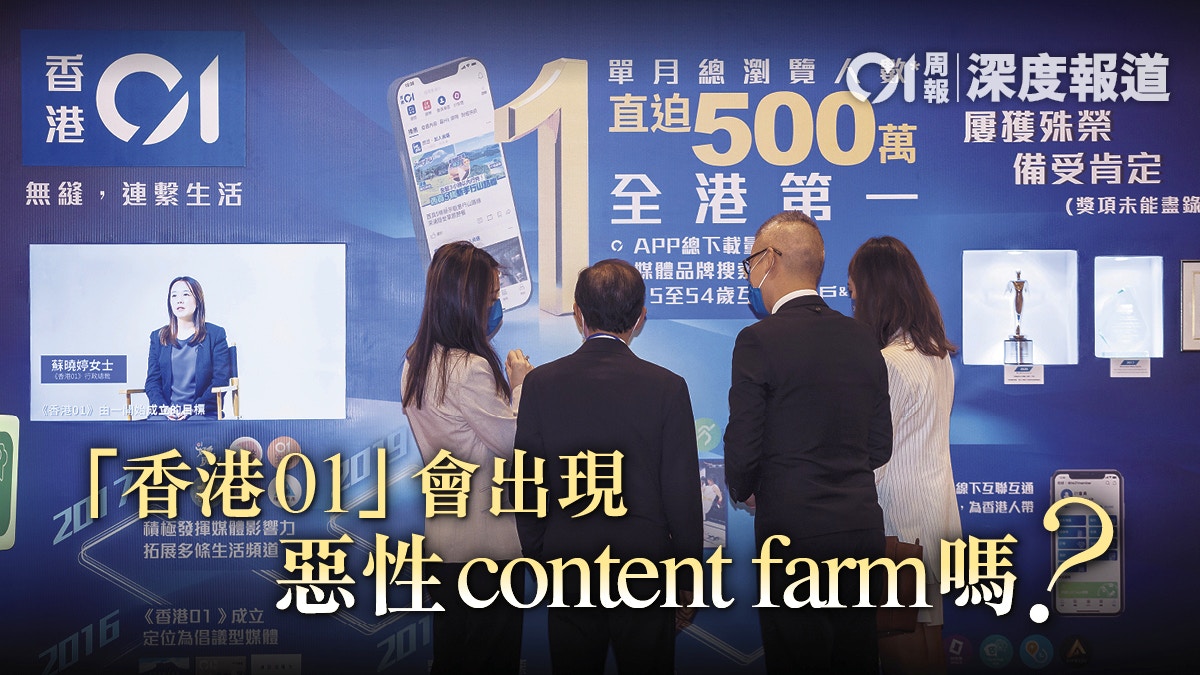weekly
Written by: Hao Ziyu
2021-06-07 19:45
Last update date: 2021-06-07 19:45
It is said that the algorithm is only a gentle behemoth, because it imperceptibly determines the user's "what you see and hear", changes people's reception of information and demand for products, and also brings opportunities for media transformation.
However, Wang Longxiao, Chief Technical Officer of "Hong Kong 01", believes that "the algorithm is not gentle at all, it is a "vicious beast"!" In the digital strategy of "Hong Kong 01", based on data, the use of algorithms is Readers' push and display of appropriate content is an important part.
However, being manipulated by algorithms always seems to be at odds with quality and temperature content.
As a media, how should we deal with such contradictions?
How to be responsible to readers and content producers?
This is the third part of a series of new media transformation reports
To undertake the above:
[New Media.
1) Looking for a way to get rid of the hegemony of the Internet. Media transformation in the digital age
Wang Longxiao said that the media must "counter" hegemony, but must first get rid of "restraint" and "mutual use" to achieve mutual benefit: "Large platforms like Facebook and Google have spent a lot of time developing a massive flow of people. And the number of visits, different markets will have different strategies. When their market strategies have dividends, why not use them?"
In 2019, live broadcast is one of the main features of Facebook, and Internet media such as "Stance News" also used the "Dongfeng" live broadcast to make good results.
Regarding this, Wang Longxiao pointed out that this is the moment of "bonus", and Hong Kong 01 has also produced a lot of content in this form in the "Live Streaming".
It is necessary and worthwhile to use the momentum of the platform within a controllable range.
However, he also said that he should not put all his eggs in the same basket, let alone put his "neck" in the hands of others-that is, he cannot give his "lifeblood" to others. "We must also stabilize ourselves.
Confronting hegemony is not to treat it as an "enemy."
He bluntly said that Hong Kong 01 also has the willingness to cooperate with Facebook, Google, Apple and other companies. For example, when they want to promote some plans in Asia, they need the assistance of local Internet companies.
For these companies, this can make the implementation of the plan easier, and for Hong Kong 01, it can also "ride on the momentum."
"But we must first grasp our core-membership and data. Fast food is easy to eat, but we can't just eat fast food." He said.
But the question is, how do you grasp your own core?
This requires data analysis capabilities.
Be careful of "backlash" while "playing with" data
During the inaugural period, in order to help colleagues complete the transition from traditional media to Internet media thinking, Tan Chunjian, senior director of Internet operations of "Hong Kong 01", will construct a "newsstand scene" for everyone to imagine: when a person stands in front of a newsstand, he will use one Two minutes to screen newspapers and magazines, different covers and headlines are a message wall, which can be regarded as an offline "Facebook feed wall", but the behavior of "purchase" becomes "click".
The layout of newsstands is also mysterious. News newspapers are usually placed at the top, entertainment categories are next to them, and life and sports categories are relatively late.
He said with a smile: "There was no big data at the time, it was just based on experience and sales to deploy newsstands. But it can be seen that the main content of Hong Kong readers' information consumption is news and entertainment, followed by supplements, and this is still the case until now."
Confronting hegemony is not to treat it as an "enemy."
Wang Longxiao said frankly that Hong Kong 01 also has the willingness to cooperate with Facebook, Google, Apple and other companies.
(Profile picture)
In other words, "data analysis" has always been there.
It can be said that Qin Chunjian led the team to experiment repeatedly and make adjustments through data feedback, which is a more scientific and detailed extension of the newsstand layout through sales.
However, data and algorithms will also bring negative effects.
As Wang Longxiao said, algorithms are vicious.
While humans are "playing" with data, they may also be "backlashed" by algorithms.
Tan Chunjian agrees with this: "Of course, clicks that are excessively pursuing traffic may end up being "distracted." When headline parties and content farms are flooded, it will be dangerous for both the media itself and the readers. "
So, does this mean that news as serious content should be the entire production of media content?
Tan Chunjian said that this is not the case. Even newsstands put entertainment and news in the same position, which shows that entertainment content is also very much bought by Hong Kong readers.
He pointed out that the main force of information consumption is still news and entertainment, but it does not mean that the part of life is not important.
Because the food, drink, travel, parent-child, travel, beauty and other sections may not be enough to compete with news and entertainment individually, but when these contents are combined, the data is very impressive.
Moreover, the feedback of traffic data shows that serious content brings far less traffic than easy content.
"Assuming that our overall traffic is 50 million, 10 million of serious content is a "big win." But it is worth noting that this 10 million traffic cannot be replaced by light content. The two cannot be replaced and complement each other. In other words, what readers need is comprehensive content.
When the reader base increases and the traffic increases, everyone will naturally look for the content they want to read.
Entertainment content is also a very important part of Hong Kong readers. At present, the main force of information consumption is still news and entertainment, but it does not mean that the part of life is not important.
(Information Picture/Photo by Liang Biling)
However, the increase in comprehensive content will inevitably lead to content farm disputes.
Wang Longxiao said that he never shy away from talking about this topic, but he believes that as a media, in addition to content for mass consumption, it should also have "head content", which contains certain values and represents the company's attitude.
"So you can't define "Hong Kong 01" as a content farm. Because the content farm has no position and no clear values." He retorted with a smile.
In Tan Chunjian's view, content farms with misleading and wrong elements are strictly defined content farms. Readers are deceived and stop buying them. Therefore, this unhealthy model should be avoided as much as possible.
But he bluntly said: "If you ask if the vicious content farm situation will happen in "Hong Kong 01"? In fact, there is, and this cannot be denied. It does happen when the click-through rate is chased because of the company's orientation...but This is not the responsibility of reporters and editors, but the entire company needs to make corrections."
But at the same time, he believes that content farm’s "ancestrality" titles like "ten ×× you don’t know", “six ×× you must pay attention to”, “three ×× that will shock you”, etc., in the early days I have indeed gained a lot of attention, so I can learn its expression and communication logic healthily from it, and use it for my own use.
"There are red lines in online news. For example, we cannot be a "headline party." But we should not be afraid of this red line. On the contrary, we should be infinitely close but not crossed. For online news, the closer to this red line, The title effect will be better." He explained in detail.
It can be seen from the spread of content farms and headline party content that in the Internet world, moderate headlines can easily cause the content to fall into the sea, so it is not advisable to take safety measures in the text for avoiding the "red line".
He pointed out that titles such as "Sino-U.S. Talks, Swords, Lips, Guns," are not easy to see in the Internet world.
Tan Chunjian bluntly said that the so-called moderate headlines are easier to write, and it will be more time-consuming and labor-intensive to carefully select specific and intense dialogues throughout the article.
When you think that you have broken away from the rules of the tech giants, you are likely to begin to be manipulated by data.
(Information Picture/Visual China)
No matter how strong the algorithm is, the existence of "people" is required
"Vicious" algorithms and "double-edged sword" data are both a test of the media.
When you think that you have broken away from the rules of the tech giants, you are likely to begin to be manipulated by data.
Human beings should use data and algorithms as tools to control themselves, rather than being led to another "other people's home."
Therefore, we need to be vigilant about technology and always retain the role of "human".
In order to help users find and access the content they want more efficiently, "Hong Kong 01" will also provide personalized content, products and services.
Indeed, the development of algorithm technology is to precisely match the individual needs of users, reduce the difficulty of screening in massive amounts of information, and save users' time.
However, algorithms have the opportunity to manipulate people's information reception and cognition in a subtle way.
The products under Beijing ByteDance Technology Co., Ltd., such as the well-known "Today Toutiao" products and "Tik Tok", are typical examples of firmly grabbing users' attention through algorithm recommendations.
However, this approach has been repeatedly questioned in recent years.
Professor Zhao Lijin of the School of Communication and Communication of Northwest Normal University wrote an article "Readers Become Users, Don’t Fall into the Trap of "Algorithms"" in Guangming Daily, referring to the data-oriented technology of algorithms, which are fundamentally capital-interest-oriented. Translated into data and characters, trying to understand people's preferences and filtering, strengthened the narrowing of cognition and the digital divide.
In this regard, Wang Longxiao said: "We are different from the headline system. They have super massive content. The characteristics of "Thousand Faces" will be more obvious. Our content volume mainly depends on self-production and cooperation." In addition to insisting on self-produced content and avoiding human beings from being "backlashed" by algorithm technology, it is also necessary to establish and affirm the subjective value of human beings in massive data and powerful algorithms.
Will content producers be "kidnapped" by data?
Fang Kecheng believes that modern media will indeed bear more pressure on page views (PV), but this also exists in the newspaper era.
The newspaper era is not a utopia that does not need to pay attention to newspaper sales. As long as it is a commercial media, it will definitely have this consideration.
But he also said that the data at the time was only newspaper sales. Now you can see the data of each article. Although it can make the media understand readers' behavior, it is also like a "curse", showing the data too specific and naked. .
And when this business logic intrudes into the news production process, data becomes a force to assist business, transferring the pressure of the boss's business to the reporter.
In this regard, Wang Longxiao pointed out that there were discussions about "data driven" and "data informed" in the early years, and "Hong Kong 01" chose the latter.
"Data-driven" means that data is the center of the team's decision-making process, and decision makers will rely on data as the operating standard; and "data-informed" means that data plays an auxiliary role in decision-making. After data is obtained, different factors still need to be considered before making a decision.
By analyzing recent "hot words" through Google, these words that have a greater chance of being searched can be used when writing articles.
﹙Profile Picture﹚
What does it mean to act exactly as directed by the data?
Wang Longxiao explained with "Automated SEO", first analyze the recent "hot words" through Google, and use these words that have a greater chance of being searched when writing the article. The technical team will give suggestions for "taging" (tags). , But it will not automatically set tags, because it is necessary to leave the editors with enough flexibility: "Our approach is to provide editors with three hot word tags for reference. We put "people" in an important position, even if the algorithm develops stronger , There is no human existence, because algorithms are just tools to help people. The autonomy and independence of news will not be diluted by algorithms."
He gave an example: "There is a very classic algorithm—recommendation algorithm, that is, you like ABC and I like BCD. We will tend to take in these parts of information. So the algorithm will think that we both look at BC. They are a kind of people who started to recommend content D to you and content A to me.” In fact, this is also the algorithm model used by WeChat and Toutiao.
He continued that with such a model, there will be smaller and smaller problems in the "circle". Therefore, when doing the algorithm, it needs some variable amount to guide. In addition to the pure technological method, it also needs people to go. Guide and constantly adjust.
Fang Kecheng believes that the data itself is not powerful. Even if you can see the click-through rate, click-through time, and even the "bounce rate", it can't show the readers' psychological feelings. Do they get knowledge improvement?
What kind of nutrition did you get?
What has happened to the brand perception of the media?
He pointed out: "We have no way of knowing this. But only by knowing this can we judge the commercial value of an article. Therefore, the data looks very strong, but in fact it is only a very one-sided and very weak judgment standard, which is not really enough. To measure the value of an article."
The above was published in the 268th issue of "Hong Kong 01" Weekly (June 7, 2021) "Powerful and Powerless Algorithm: The Subjective Value of "Human" Must Be Established". If you want to read the full text, please
click here to
sample the weekly newsletter and browse more in-depth reports.
Highlights of the 268 issue of "Hong Kong 01" Weekly News:
[Cover report] Looking for a way to get rid of the hegemony of the Internet and the media transformation in the digital age
Should not rely on the Mainland to solve problems, Hong Kong needs a long-term population policy
Internet hot words exposing the heavy status quo, "laying flat" young people are fighters
Speaking of co-productions, is there a way out for Hong Kong movies?
The economic structure has failed to keep up with manpower demand. "Devaluation of academic degrees" The crux of the problem lies in industry consolidation
From the sub-press crisis to the new crown epidemic, the American car ``home'' family looking for their homes
New media paper media communication facebookGoogle Hong Kong 01 Hong Kong 01 5th Anniversary In-depth report on Hong Kong 0101 Weekly


/cloudfront-eu-central-1.images.arcpublishing.com/prisa/A7ILNOIJXVADBCVPS2M35FWQSI.jpg)





/cloudfront-eu-central-1.images.arcpublishing.com/prisa/SLKF2MACKFCSZIBGRYJ3TH37WQ.jpg)